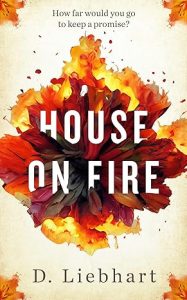On Writing House On Fire
 I recently finished The Crown. I’m not much of a TV person. It’s common for me to view an episode or two of a series with my husband, lose interest, then proceed to do other things while he follows a show through to its finale. I can count on one hand the series I’ve watched from beginning to end. The Crown being the fifth.
I recently finished The Crown. I’m not much of a TV person. It’s common for me to view an episode or two of a series with my husband, lose interest, then proceed to do other things while he follows a show through to its finale. I can count on one hand the series I’ve watched from beginning to end. The Crown being the fifth.
I’m a minor anglophile. My mother was British (emphasis on the “was” as she took great pride in letting people know she was American whenever they commented on her accent). The Royal family is my heritage. Tea cups commemorating the Queen’s Silver Jubilee and a tea tray featuring Princess Diana and Prince Charles’s engagement photo were used in our house. They are amongst the few things I kept after my mother’s death.
I know the Crown is fiction. Watching a clip of King Charles giving a speech after seeing his TV counterpart do it better reinforces that in great measure as does watching the real Diana and experiencing the inexplicable charism that was both her gift and curse. After each episode I found myself searching at least one or two things for accuracy: “Did Dodi Fayed propose?” “Why didn’t Charles marry Camilla in the first place?” “Did William watch the Jubilee with Kate?”
In a way The Crown is doing the royal family a favor, portraying them as complex, emotional human beings that people can engage with while leaving the real royals alone to get on with their lives. Most of the characters (save for Harry) come off more sympathetically than they do in real life. In a Town & Country article, Robert Lacey, the Crown’s historical consultant, talks about historical truth versus the larger truth about the past. Dominic West one of the actors who portrays Charles talks about being true to what’s going on emotionally, which leads me (the long way around) to my novel, House on Fire.
In House on Fire an ICU nurse is asked by her mother to euthanize her father who’s living with dementia. The book is strongly based on my family. My father had dementia for ten years. My mother talked often of how my dad would have killed himself if he’d had any idea he’d get dementia. I wouldn’t swear to it but I’m near certain my mother said the exact line that appears in the book: “If he knew this was going to happen to him, he would have gone out in the backyard and blown his brains out.”
The long drawn out tale from my dad’s first signs of dementia to his death in assisted living, however, doesn’t make for a good novel. As sad as it was, our family’s experiences were not unique and they didn’t shape themselves around an engaging story arch worth reading. House on Fire isn’t true in that sense, but it is emotionally true. I think fiction can be, or at least seem to be, more emotionally true than real life.
It’s difficult to explain what it felt like when I realized my father no longer recognized me. Telling the story might garner sympathy but not evoke the emotions I felt. When it happens in a novel, it can be framed and built up so that the reader experiences it with the character. I like to think that’s what happens in my book. As a reader, I know that a novel is working when I’ve lost myself in it and am feeling along with the characters, not thinking about the storyline. One reader described the characters in House on Fire as achingly real. I love that.
The opening line of the book is: My mother asked me to kill my father on Christmas. When it came to me, I knew where the story would start and where it would end. I didn’t have any idea how the characters would get from point A to point B but I recognized immediately that the first line gave the characters something we didn’t have in real life: power over the events that were happening. Every time my mother said my dad would’ve killed himself or he didn’t deserve what was happening to him, she was expressing her anguish, her desperate desire to be able to change our reality. In my book, I gave that power to my mother. I made her a person who would ask that question, then had the family live though what might have been.
Fiction can tell the truth. This alternate reality is an exploration of possibilities, not what I wish would have happened. The story offers different truths than my personal experience, its own truths. It challenges readers with questions of right and wrong, loyalty and love, and ones that keep you up at night: Would you do it? Could you do it?
As a former ICU nurse, I’ve been with families on their worst day. I’ve held their hands and cried with them. House on Fire isn’t the real story of what happened to my family. It’s a story that I hope takes readers on a journey through their own values, hearts, and souls. That’s the truth I want to tell. That’s a truth I’m proud to tell.
HOUSE ON FIRE
 How far would you go to keep a promise?
How far would you go to keep a promise?
Bernadette Rogers swore she’d never put her father in a nursing home. Does that include euthanizing him to keep her word? Her mother thinks it does. Bernadette isn’t so sure. And even if she were, it’s not like you can walk into a drug store and buy Nembutal.
As an ICU nurse she’s no stranger to the blunt realities of death, but her mother’s request to help her father—who’s disappearing into the abyss of dementia—go “peacefully” blindsides her. Her mother thinks it’s assisted suicide. Bernadette knows better. Even if they do it for all the right reasons, it would still be murder.
Surrounded by conflicting voices, Bernadette doesn’t know which way to turn. Her self-righteous sister insists it’s a sin. Her magnanimous ex thinks her mother will try it alone. Then her best friend offers to help. What was supposed to be a relaxing two-week break becomes an emotional rollercoaster as Bernadette is forced to make an agonizing decision about her beloved father and figure out just how far she’s willing to go for love.
For fans of Jodi Picoult and Lisa Genova, House on Fire is an unforgettable story of family, friendship, and the promises we aren’t sure anyone should honor.
BUY HERE
—
D. Liebhart is a nurse and writer. She writes (and sometimes lives) stories about ordinary people in extraordinary circumstances, where they learn that life is rarely predictable and answers to life’s most complex questions are almost never black and white.
House on Fire, her debut novel, was long-listed for the 2022 Petrichor Prize. Her essay Thalassophobia (a true account of a very out-of-the-ordinary honeymoon) won the 2021 Linda Julian Creative Nonfiction Prize from Emrys Journal and is now available on her website. https://dliebhart.com/
Category: Contemporary Women Writers, On Writing

























